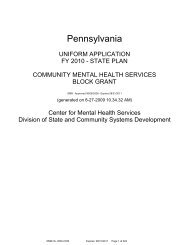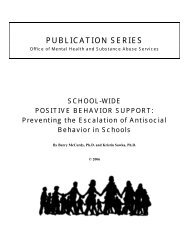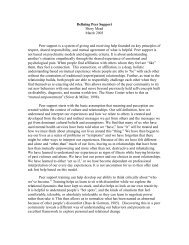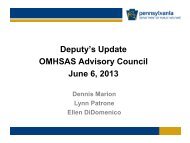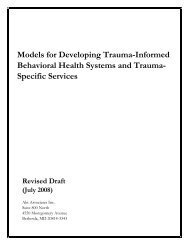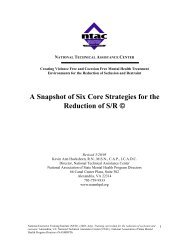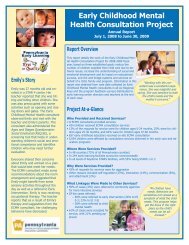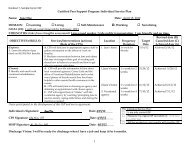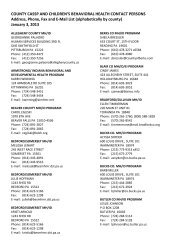CRIF: Self Directed Care Delaware County, PA - Pennsylvania ...
CRIF: Self Directed Care Delaware County, PA - Pennsylvania ...
CRIF: Self Directed Care Delaware County, PA - Pennsylvania ...
Create successful ePaper yourself
Turn your PDF publications into a flip-book with our unique Google optimized e-Paper software.
<strong>CRIF</strong>: <strong>Self</strong> <strong>Directed</strong> <strong>Care</strong><br />
<strong>Delaware</strong> <strong>County</strong>, <strong>PA</strong><br />
Presentation to the OMHSAS Joint<br />
Advisory Committee<br />
March 4, 2010<br />
Erme C. Maula, RN, MSN, CRRN, CPS<br />
Program Manager<br />
Mental Health Association of<br />
Southeastern <strong>Pennsylvania</strong><br />
3/4/2010
<strong>CRIF</strong> SDC<br />
• <strong>CRIF</strong>: Consumer Recovery Investment<br />
Funds<br />
• SDC: <strong>Self</strong> <strong>Directed</strong> <strong>Care</strong><br />
3/4/2010
3/4/2010<br />
<strong>CRIF</strong> SDC
Collaborators<br />
• Magellan Health Services<br />
• Office of Behavioral Health, <strong>Delaware</strong><br />
<strong>County</strong>, <strong>Pennsylvania</strong><br />
• University of <strong>Pennsylvania</strong><br />
• Mental Health Association of Southeastern<br />
<strong>Pennsylvania</strong><br />
3/4/2010
Meet the Recovery Coach Team at<br />
MHASP<br />
Joseph Rogers, Director<br />
of Advocacy<br />
Brett Diamond, Billing<br />
Clerk and<br />
Administrative<br />
Assistant<br />
Tim Connors, CPS,<br />
Recovery Coach<br />
Erme C. Maula, RN,<br />
MSN, CPS Program<br />
Manager<br />
3/4/2010
Philosophy of <strong>CRIF</strong> SDC is based on<br />
the following elements:<br />
• Recovery<br />
• Peer Support<br />
• <strong>Self</strong> <strong>Directed</strong> <strong>Care</strong><br />
3/4/2010
Recovery<br />
• The program philosophy is based on the<br />
fundamental idea that people can and do<br />
recover from mental illness.<br />
• Recovery is a deeply personal process<br />
that involves restoration of hope, self-<br />
esteem, creativity, and self-determination.<br />
• Recovery is a life-long long journey that<br />
restores and maintains individual dignity<br />
and control over one’s own destiny.<br />
3/4/2010
Peer Support<br />
• All Recovery Coaches of the <strong>CRIF</strong> SDC program are<br />
Certified Peer Specialists.<br />
• Peers helping other peers has been identified as a critical<br />
part in the recovery process.<br />
• The President’s New Freedom Commission on Mental<br />
Health (2003) explicitly recognized the critical role of<br />
peer support.<br />
• People who are employed as Recovery Coaches have the<br />
unique capacity to inspire hope, trust, personal<br />
responsibility, empowerment, self-determination and<br />
social connectedness in their fellow peers.<br />
• Recovery Coaches are able to use their own Recovery<br />
Journey as an example of how recovery is possible.<br />
3/4/2010
<strong>Self</strong> <strong>Directed</strong> <strong>Care</strong><br />
• This approach supports individuals in developing their<br />
own wellness goals and in controlling the funds that are<br />
used to implement their self-directed behavioral health<br />
recovery plan.<br />
• Each person is responsible for making his or her own<br />
choices on the recovery journey and must be responsible<br />
for the outcomes of those choices.<br />
• Giving people decision-making power over their own<br />
behavioral health-care budget is a concrete step toward<br />
self-determination and responsibility.<br />
• The process of creating a recovery plan, identifying<br />
appropriate services, and deciding how to spend service<br />
dollars advances one’s independence and self-<br />
determination.<br />
3/4/2010
Recovery Values<br />
HOPE<br />
INDIVIDUALITY<br />
SELF AWARENESS<br />
SELF DETERMINATION<br />
MEANINGFUL LIFE<br />
RESPECT<br />
PEER SUPPORT<br />
COMMUNITY FOCUS<br />
ADVOCACY<br />
3/4/2010
Criteria for Enrollment<br />
• <strong>Delaware</strong> <strong>County</strong> Resident<br />
• Member of Health Choices, Magellan Behavioral<br />
Health<br />
• Diagnosed within either the schizophrenia or<br />
bipolar family<br />
• 60 th – 90 th % utilizer of services<br />
• No hospitalizations within the past 6 months<br />
• Randomized into University of <strong>Pennsylvania</strong><br />
study<br />
• 150 total in study: 75 in control, 75 in SDC<br />
3/4/2010
Process for Enrollment<br />
• Study group randomized by Magellan Health<br />
Services, letters sent to 50 at a time<br />
• University of <strong>Pennsylvania</strong> contacts potential<br />
participants for enrollment<br />
• Participants enrolled in study are randomized<br />
into Control or SDC group<br />
• SDC Group is enrolled by MHASP Recovery<br />
Coach Team<br />
• Orientation followed by monthly visits over 24<br />
month period<br />
3/4/2010
Process of Engagement<br />
• Establishing relationship<br />
• Exploring Dreams<br />
• Setting goals from dream exercise<br />
• Reviewing past 24 hour utilization with peer<br />
• Setting budget from goal activities<br />
• Requesting authorization for purchases<br />
• Authorization approved by Magellan Health Services<br />
• Purchase amount placed on Allow Card<br />
• Monthly check-ins with Recovery Coach, or as<br />
determined by Participant<br />
3/4/2010
MH Budget<br />
• Budget is set with actual utilization<br />
• Moving forward: all In-Plan (traditional<br />
Medicaid Reimbursable services, including<br />
Peer Support by Recovery Coach) and all<br />
out of Plan/non-traditional services<br />
(Freedom Funds) will be budgeted within<br />
actual past 24 month utilization<br />
3/4/2010
Recovery Goals<br />
• All activities and purchases must fit within<br />
the Participant’s Recovery Plan<br />
• These can change over time<br />
• Recovery Coaches help to educate<br />
Participants about the concept and<br />
process of recovery<br />
• The Recovery Coach team keeps track of<br />
proposed monthly budget as well as actual<br />
utilization over the next 24 months.<br />
3/4/2010
What we have learned<br />
• Similar to the Dallas, TX, program, we<br />
found that some of the first “asks” were in<br />
regards to physical medical health<br />
• We focus on dreams, opposed to<br />
assessments. <strong>Self</strong> <strong>Directed</strong> <strong>Care</strong> allows<br />
the peer to set the area of focus<br />
• It takes a while for people to understand<br />
the idea and process of recovery<br />
3/4/2010
First “asks”<br />
• Back Rent<br />
• Electric Bill<br />
• Exercise Clothes<br />
• Gym Membership<br />
• Computer Software to write poetry<br />
• Glasses<br />
• Specialist visit to Ear, nose, throat (apnea<br />
study, etc.)<br />
3/4/2010
Allowcard<br />
• Similar to a check/credit card<br />
• Decreases the stigma of mental health<br />
• Allows participant to have responsibility of<br />
funds<br />
• Allows restrictions to be placed on card<br />
from Program Staff (certain items are not<br />
allowed to be purchased: alcohol, illegal<br />
drugs, guns, cash, pornography, etc.)<br />
• Allows monitoring of activity<br />
3/4/2010
Next Steps<br />
• 5 people enrolled in study<br />
– 2 in SDC<br />
– 3 in Control (services as usual)<br />
• Moving forward with Recovery Process and Peer<br />
Support with “enrollees”<br />
• Meeting with non-MH Providers to talk about<br />
Recovery and ask for possibilities of services to<br />
purchase<br />
• Operations Team meetings<br />
• Reporting with State, <strong>County</strong><br />
3/4/2010
How exciting would it be if…<br />
• We can show that working with a Recovery<br />
Coach/CPS/WRAP Facilitator moves people forward in<br />
their recovery<br />
• By allowing people to self determine what works for<br />
them, we spend less, or the same amount as they would<br />
cost the system<br />
• By allowing people to direct their own care will move<br />
them forward in their recovery<br />
• We can model how four very different entities can work<br />
together successfully<br />
• We are able to create more CPS job positions<br />
• We help to establish a waiver to allow this to happen in<br />
other parts of the state<br />
3/4/2010
Contact Information for <strong>CRIF</strong> <strong>Self</strong><br />
<strong>Directed</strong> <strong>Care</strong> Team:<br />
Recovery Coach Team:<br />
Tim Connors, CPS; Recovery Coach<br />
Erme C. Maula, CPS; Recovery Coach<br />
Brett Diamond, Administrative Assistant and Billing Clerk<br />
Phone Number: 267-507<br />
507-3873<br />
SDC@mhasp.org<br />
Erme C. Maula, RN, MSN, CRRN, CPS<br />
Program Manager, <strong>CRIF</strong><br />
Mental Health Association of Southeastern <strong>Pennsylvania</strong><br />
1211 Chestnut St., 11th Floor<br />
Philadelphia, <strong>PA</strong> 19107<br />
emaula@mhasp.org<br />
Office: 267 507 3873<br />
Fax: (215) 525-9698<br />
3/4/2010



